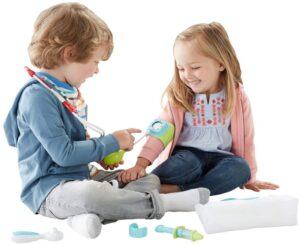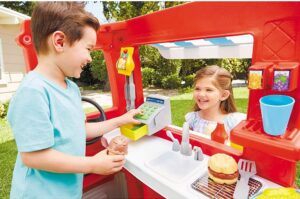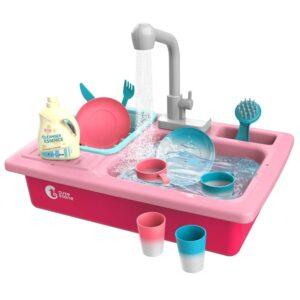Toddlers are hands-on learners and imitator, they learn the new things learn by observing, imagining and doing. Over the years, Researches have shown that Pretend Play forms a vital part of a child’s normal development. No matter your little one pretending to make food with the play kitchen or pretending as a doctor taking care of the baby doll, they are building skills in many essential developmental areas. Following is a list of “benefits of pretend play in early childhood” to help you understand the importance of pretend and imaginary play.
Cultivate social and emotional skills

Pretend and imaginative play is a great way to teach young kids to interact with others and understand social relationships. When children engaging in creative play with their friends and pretend the different characters, they learn how to cooperate with each other, take turns, negotiate, solve problems, compromise.
By observing and pretending play, they experience the social roles of life which help them to understand who they are as an individual, learn how to communicate and respond to the world.
Playing with dolls and toy action figures has great value on your child’s development. And the forms of pretending play that a few children play together will get them to involve in eye contact and using different tones and emotions to communicate, which encourages their social cues development and social interaction.
Develop language skills

Language gives us the power to express ourselves, and pretend play is a great way for the young child to learn and experience language power. Young children can learn about new words through parents or caretakers explaining features about nature and social issues or telling story during bedtimes. And the pretend play offers them the great opportunity to experiment freely with the new words in their own way. During the playtime, they gradually understand that words provide them the power to re-enact situations, elaborate the view.
Sometimes parents can hear their child come out some words or phrases that they didn’t know they knew when their child has the imaginative play with their friends. Through imaginative play and role play, they also expand new words with their friends. They usually will get involved with different scenarios such as hospitals, restaurants or the kitchen, which not only widening their vocabulary scope but also help them know about more knowledge of daily life.
Communicate skills is important for our social life. Children can learn about how to communicate with others by pretend play, they need to think about which words to use so they can get themselves understood what they are trying to express. And also they have to listen and figure out what others say about and how to respond to them. They are required to talk with each other to get the game organized and that helps improve their communicating skills.
Enhance physical development
Aside from the capacity for cognitive flexibility, an important benefit of early pretend play its enhancement of the child’s physical development. The make-believe play encourages children to be active, getting involved with a lot of opportunities to exercise their muscles. Gross motor skills can be developed when they pretending as a cop chasing the bad guys, climb up the ladders like a firefighter. Working with pretend play toys like cutting the pretend fruit, dressing the doll in the fashion clothes, washing the dishes, fixing the stuff with drill promotes fine motor skills and hand-eye coordination.
Sparks Creativity

Kids can find the objects around them to create their excitement and fun play. I often see my niece use the round building blocks as donuts or a small cloth as a blanket for her baby doll. We often see these objects for what they are, but for kids, they can find the creative way for their imaginative play.
Encourage Self-Expression
Pretend play provides a comfortable environment for kids to express themselves. They can pretend to be whoever they want to be. They can express freely what they like, what they don’t like, what they need and what they want. It is common for the therapist to use the play method to encourage young kids to express their feelings during difficult events. Dolls often become versions of the child himself and are a safe way for children to express new ideas and feelings. Watch them playing, sometimes you might get some important information about your kids, and that helps you know better about them.
Develop thinking and organizational skills
When children play, they often plan out the scenarios and think about what toys they need for their imaginary play. Then they organize the toys in the way they want it to be. Onetime, I saw my niece “preparing” a meal, she made different kinds of food and put them organize on the table, and she put a piano toy near the table. She invited me to have “dinner ” with her, and she played the piano for me and after “dinner”. She planed out that is a date dinner, so she found the food toy and piano placed them in a specific way. Pretend play encouraged her to use thinking and  problem-solving skills.
problem-solving skills.
Helps prepare for life events
Kids often scared of visiting doctors or dentists. Playing with pretend toys like doctor kit, dentist medical kit, kids can know more about medical knowledge, they will become braver when going to a dentist. Through role-plays, they can be prepared for life events in a safe and comfortable way. They learn how to behave at a restaurant, what to do if there is a fire or how to react if they see a stranger.
Build life skills
When kids engaging in pretend play, they also learning some basic and important life skills. They learn how to take care of the baby gently, place the tableware, wash dishes, tie shoes, use the cookware.
Pretend play fosters mental and physical growth by creating opportunities for trying out new ideas, ways of thinking and problem-solving, manipulate different objects, exercise. There are so many benefits of pretend play in early childhood. It is fun too!
P.S. Wonder what kinds of pretend toys are fun and educational for toddlers? Click Here
